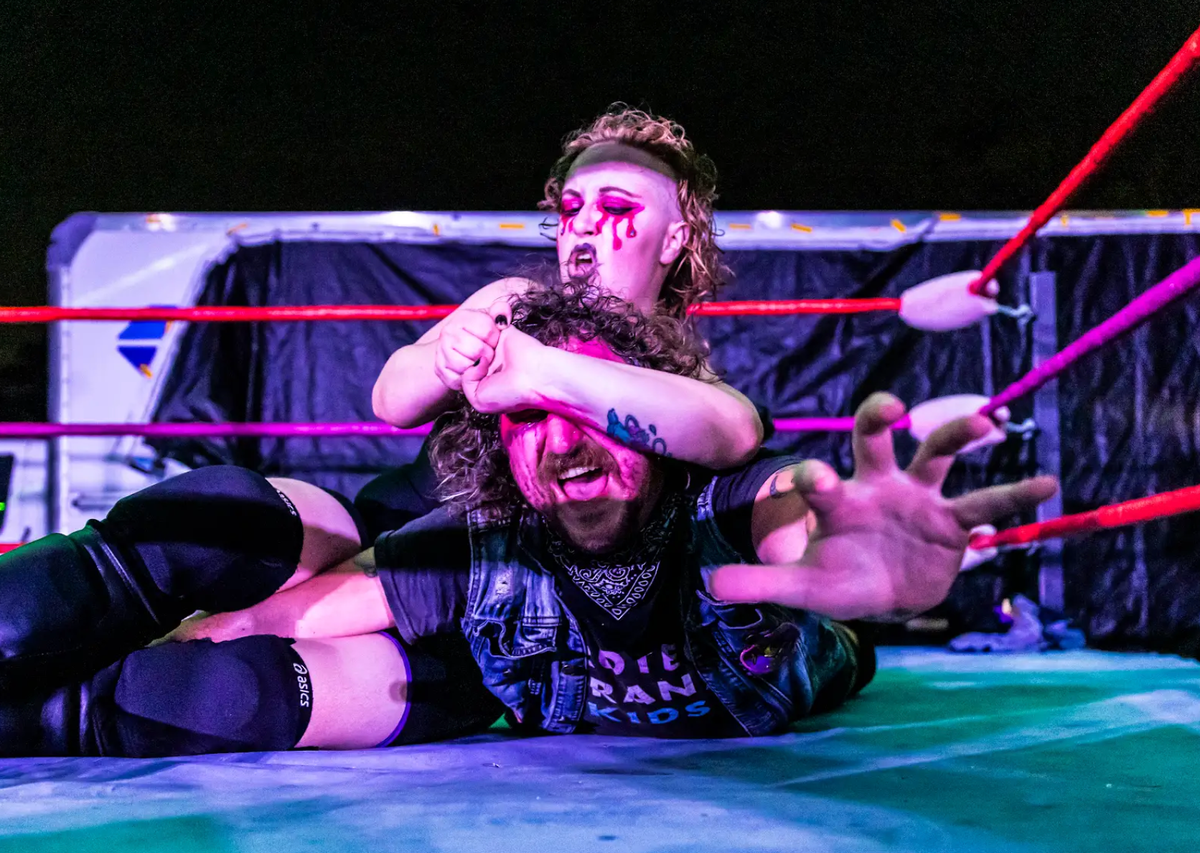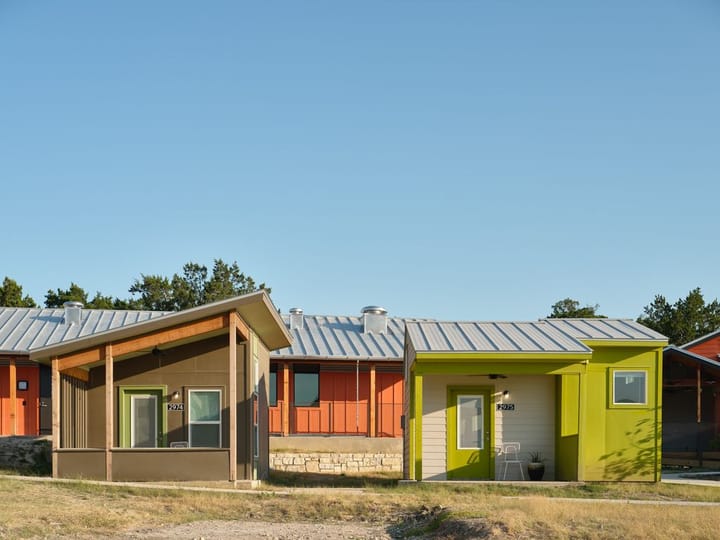Queer Pro Wrestling Is Growing In Texas
Pro wrestling is starting to see much greater LGBTQ+ representation, especially in Texas.

Imagine a professional wrestling match. Lightning-fast exchanges of holds and strikes, death-defying moves off the top rope, slams that look like they should break a person in half. Have you got it? Okay, now add full musical numbers right out of Broadway.
That’s the sort of innovation that happens when LGBTQ+ people run wrestling.
This example comes from Fight Opera in Austin. The promotion began booking shows in June 2022, mostly on the stately grounds of the Pink Flamingo Plant Company. Their organization is queer led, with roughly 50 percent of the crew and performers being LGBT. One of those is Sam Carey, co-head of creative and a grappler under the moniker Crybaby. They didn’t grow up watching American wrestling but fell in love with the art form when a friend loaned them a login to watch New Japan Pro-Wrestling.
Recently, they staged Phantom of the Fight Opera, a large-scale theatrical production that mixed the stagecraft of Andrew Lloyd Webber’s famous musical with standard wrestling. It wasn’t easy.
“A really big focus is the theatricality and the storylines, the props, the costumes, the sets,’ says Carey. “High concept shows bring big audiences, but even as one of the people most loudly calling for a musical, it was so much more work than I realized it would be. The coordination of musical numbers, themes, and matches as we normally do. We had a Phantom, and we wanted to do some trickery like appearing from nowhere, so we needed moveable sets.”
It sounds camp, and it is, but pro wrestling has always been built on camp, even back to the days when it pretended to absolute realism (kayfabe). Texas has a long history with wrestling, everything from the legendary Von Erichs to imported lucha libre from Mexico to the biggest stars of the WWE like “Stone Cold” Steve Austin and The Undertaker.
Consequently, audiences expect wrestling, not just theatricality cosplaying wrestling. Carey and their crew still deliver the hard hits.
“We have a bloodthirsty audience,” they say. “They want to see someone slammed, but they have to get cool with some real weird s***. Performers do their best to project their motivations. I’m sure there were people who came to Phantom and we’re like, ‘why is that horse singing?’”
Drag queen wrestling is also gaining in popularity, with Drag and Dropkick events appearing in most major Texas cities at least once a year. Jaime “High Me” Martinez of Loko Wrestling has been instrumental in building a following of them in Houston.

“Last year we did a collaboration with Pride Style from Las Vegas,” he says. “We’re very big on supporting LGBT wrestlers. Our fans get it, but sometimes wrestling can be very weird. The proudest moment of that collaboration was that we got so many types of fans in the crowd. Love a diverse crowd. Not just a lucha crowd or an American crowd, but all types. I had so much fun and promoted it really hard.”
Loko books exoticos. In the Mexican lucha libre tradition, exocticos are the wrestling equivalent of drag performers. At first, many of them assured audiences that they were cisgender heterosexual males merely performing a character. In the 1980s, a number of exoticos came out as LGBT. Steadily, exoticos have grown to be the cutting edge of gender diversity and sexual identity, challenging norms with their costumes, skill, and toughness.
Martinez, who is not LGBT, is immensely proud of booking exoticos and the crowds they draw. One stand out was a fantastic match between drag wrestler Super Oprah and Big Mami, which drew hundreds of fans and involved incredible moments like Oprah flying through several rows of chairs after a dodge by Mami.
That “anything can happen” attitude is one reason Loko books shows at punk venues like White Swan. Their next appearance, No Rings No Masters, is January 25.
“I throw party wrestling,” he says. “I give out free beer, book what the fans want.”
It’s not all drag queens. Pro wrestling is starting to see much greater LGBTQ+ representation. It’s been an open secret for years in the WWE that Shayna Baszler and Dakota Kai are a couple. Trans wrestlers like Gabbi Tuft, Dark Sheik, and Commander Sterling are becoming draws on the independent circuit.
Paul Pratt is a native Houstonian who has been in the wrestling industry for decades. He performs as a ringside manager and drag queen called Pollo Del Mar as well as working as a journalist for the NWA’s official magazine. It’s given him an inside view to the changes for LGBTQ+ wrestlers.
“Historically speaking, the most flamboyant characters that LGBT people might see themselves in were the heels,” he says. “The suggestions of latent homosexual tendencies were used to draw the ire of the audience. That is something that has taken time to change. More LGBT characters can be the heroes, the babyfaces, and beloved by audiences now.”
Pratt sees the changes as subtle, but important. As an example, he cites a recent moment in AEW last June. Wrestler Anthony Bowens, a member of the tag team The Acclaimed, was being hit on by a woman with a rival faction, Harley Cameron. Bowens responded, “Lady, I’m gay,” and the crowd went wild.
“An entire stadium started chanting ‘He’s gay,’ but not in a way that was negative,” says Pratt, “It never had to be brought up again. For years when a villain would beat a hero badly announcers would say something like, ‘He’s got a wife and kids.’ I want moments where they can say, “’He has a husband and kids.’ Being queer can be part of the identity without being the core of the character.”
Pratt has traveled all over the country and says that it will surprise people who is willing to accept LGBT themes in wrestling. Big cities can have hostile crowds, while backwaters can be open-minded.
Another person who found that out was Lynn Frailey, the founder of Uncanny Attractions, now based in Austin. A producer who has worked on the likes of Coachella, she got into wrestling through her personal trainer in Brooklyn, MV Young. She went to see his match, and was impressed with the athleticism, but less so at the production values. She decided to put her own, very queer spin on it and started a promotion performing out of the famous House of Yes in Brooklyn, a gay nightlife hotspot.
“Can we have drag queens? I want to push the envelope,” she says. “This is performance art; people are telling stories. Drag queens are very similar. They’re in character, performing. There’s just a lot of crossover. The trans wrestlers get a place to live out their life, be cheered on and respected, which is so unlike too many other times in their lives.”
Frailey was a Texas native who watched the Von Erichs as a child. She was down here attending a Mission Pro Wrestling event when she struck up a conversation with two very inebriated fans.
“They asked why I was there, and I started telling them about Uncanny Attractions,” she says. “The man said, ‘I don’t know if I like all that stuff,’ and I knew that Texas needed us. To come down here.”
Uncanny Attractions started out almost cursed. In 2022, Frailey booked shows at outdoor Austin music venues like Mohawk and Highland Lounge. They were immediately rained out. Frailey kept going, and now her events draw regular crowds. It’s given Frailey a chance to play stage mother to both queer and straight wrestlers while innovating the wrestling business.
“I’m just glad we can show the world something new,” she says. “We’re not where we were in Brooklyn, but we’re getting there. Gay and straight say the locker room is really fun. They can’t wait to come back and hit me up over and over again.”



Comments ()